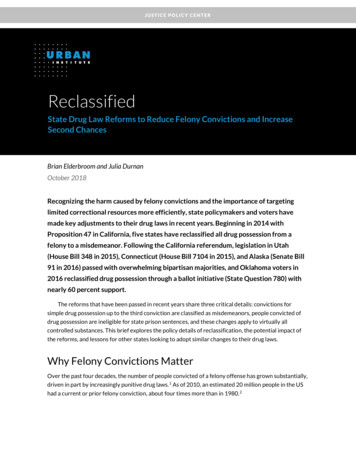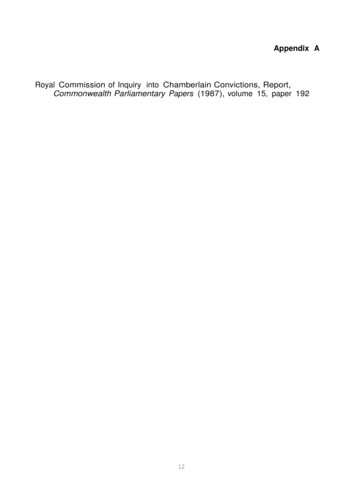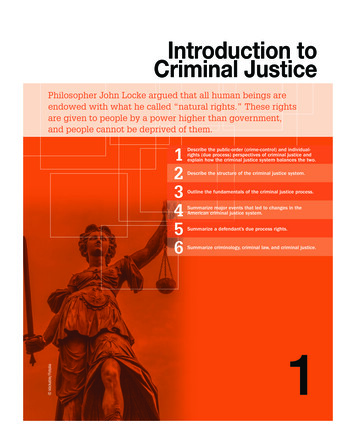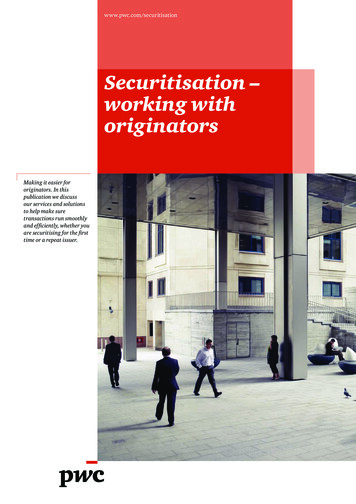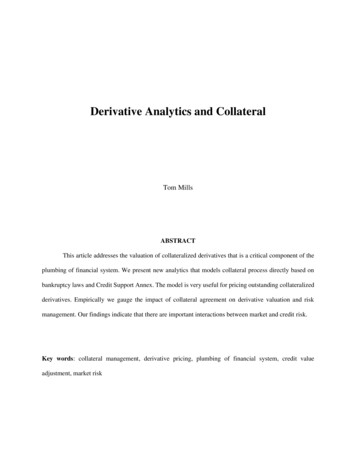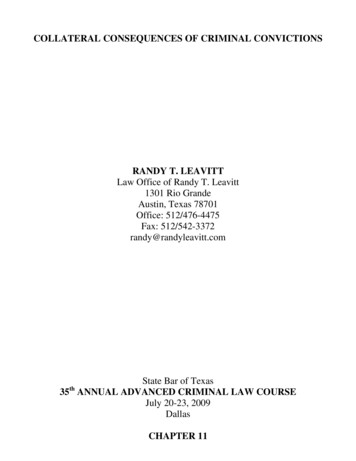
Transcription
COLLATERAL CONSEQUENCES OF CRIMINAL CONVICTIONSRANDY T. LEAVITTLaw Office of Randy T. Leavitt1301 Rio GrandeAustin, Texas 78701Office: 512/476-4475Fax: 512/542-3372randy@randyleavitt.comState Bar of Texas35 ANNUAL ADVANCED CRIMINAL LAW COURSEJuly 20-23, 2009DallasthCHAPTER 11
RANDY T. LEAVITTLaw Office of Randy T. Leavitt1301 Rio Grande StreetAustin, Texas 78701Office: 512/476-4475Fax: 512/542-3372randy@randyleavitt.comEducation:B.S. in Education, Southwest Texas State University, 1977J.D., Texas Tech University School of Law, 1980Staff & Associate Editor, Texas Tech Law Review, 1978-80Licenses:State Bar of Texas, 1980United States District Court, Western & Southern Districts of TexasUnited States Court of Appeals, Fifth CircuitProfessional Activities:Member:Texas Criminal Defense Lawyers Association-Board of Directors, 1993-99Austin Criminal Defense Lawyers AssociationCollege of the State Bar of TexasTravis County Criminal Law & Procedure Section–Former PresidentTexas Bar Foundation-FellowState Bar of Texas Task Force on Habeas Counsel Training and QualificationsAustin Bar AssociationPast-Member:Texas District and County Attorneys AssociationAustin Young Lawyers Association Board of DirectorsPresentations and Publications:Course Director, Advanced Criminal Law Course 2008, San Antonio, TexasNumerous articles of continuing legal education presented at programs throughout theState of Texas including Defenses, Confessions, Pre-Trial Procedures, Exculpatory Evidence,DWI Field Sobriety Testing, and HGN, Cross Examination, Involuntary Manslaughter, Brady: ToTell or Not To Tell, for the State Bar of Texas, Texas District and County Attorneys Association,Austin Criminal Defense Attorneys Association, Texas Criminal Defense Lawyers Association,Texas Association of Counties and Travis County Bar.Fifth Circuit Survey, Criminal Law & Procedure, Texas Tech Law Review, Vol. X, No. 3, 1979Horizontal Gaze Nystagmus, Voice for the Defense, Vol. 22, No. 9, 1993Honors and Certifications:Board Certified–Criminal Law, Texas Board of Legal Specialization, 1987 – 2009Selected as a “Texas Super Lawyer” by Texas Monthly Magazine, 2003 – 2008Mediator-qualified pursuant to § 154.052 Texas Civil Practice Remedies Code
Collateral Consequences of Criminal ConvictionsChapter 11PrefaceThe originator of the material for this article is Pamela J. Lakatos, a criminal defense lawyer from Plano, CollinCounty, Texas. She wrote an article entitled “Ethical Pitfalls in the Practice of Law” and presented it to the DallasCounty Bar in January, 2007. We have taken Ms. Lakatos’ article, with her permission, and reorganized it somewhat,updated some areas and expanded others but by in large, it is her work-product. I am extremely appreciative andforever indebted to Ms. Lakatos for allowing us to use her article. I also want to thank Matt Harding, a second yearlaw student of the University of Texas Law School, who is currently serving as an intern in the Felony Trial Divisionof the Cook County State’s Attorney Office in Chicago, Illinois, for his tireless research and contributions to thisarticle. I could not have done it without him. Thank you Pamela and Matt.Randy T. Leavitt
Collateral Consequences of Criminal ConvictionsChapter 11TABLE OF CONTENTSI. FINANCIAL CONSEQUENCES . 1II. RESTRICTIONS ON RIGHTS AND PRIVILEGES . 5III. INDIRECT CRIMINAL CONSEQUENCES. 9CONCLUSION. 10i
Collateral Consequences of Criminal ConvictionsChapter 11regulatory agencies, are virtually automatic. Felonyconvictions, and convictions for crimes of moralturpitude, can lead to the automatic revocation of andineligibility for a wide variety of federal and statelicenses. In the past, one could enter a plea to deferredadjudication and be assured that the offense couldnever be used against the client. This has changed.Now deferreds are routinely reported and used as thebasis of sentence enhancements and disqualificationsas to employment and immigration.COLLATERAL CONSEQUENCES OFCRIMINAL CONVICTIONSA Texas woman pleads guilty to a misdemeanorin 1969, successfully completes two years of probation,and the charge is dismissed. She subsequently operatesa child-care facility, in full compliance with licensingrules, until 1998; in that year, the Texas Department ofProtective and Regulatory Services amends thelicensing rule and attempts to revoke her license.Although the Attorney General’s Office declinedto address the merits of this particular case, itsconclusion was unequivocal: “The Texas Departmentof Protective and Regulatory Services may revoke thelicense of a child-care facility operator who wasconvicted of a criminal offense.” Tex. Atty. Gen. Op.JC-0130, 1999 WL 972571 (Tex.A.G.)The idea that a 29-year-old misdemeanorconviction could result in the loss of a person’slivelihood seems counter-intuitive, if not down-rightdraconian. However, this example illustrates a realitythat may be surprising to both lawyers and laymenalike: relatively old and minor criminal convictions canlead to a wide variety of major and unexpectedcollateral consequences.When trying to discover all of the ramifications ofa criminal conviction, one finds that it is not an easytask. The consequences are not laid out in one easylocatable statute but are scattered throughout variouscodes and statutes of the state. Restrictions forconvictions range from constitutional provisions that“equal rights” do not apply to prohibitions againstobtaining professional licenses or occupational permitsand to other unknown restrictions found in the variouscodes of this state.Although there is substantial overlap, theseconsequences can be roughly divided into three broadcategories: financial consequences, restrictions onrights and privileges, and indirect criminalconsequences. This paper attempts to identify andsummarize some of the most common consequences.1. Texas Occupations Code § 53.021 allows licensingauthorities to revoke, suspend, or deny licensure toanybody convicted of a felony or misdemeanor directlyrelating to the duties of the licensed occupation. As theopening case demonstrates, licensing bodies have widelatitude in this area, and even a very old conviction canbe considered for licensure purposes. To illustrate thepotential impact of this provision, the following is a(non-exhaustive) list of Texas occupations for which acinet/licensedoccupations. Athletic Trainer Attorney Tax Professional Emergency Medical Technician Pawnbroker Stenographer Occupational Therapist Physical Therapist Massage Therapist Midwife Underground Storage Tank Installer Long Term Care Nurse’s Aide Nursing Facility Administrator Optician Polygraph Examiner Respiratory Care Practitioner Sanitarian Athletic Agent Teacher Barber Speech/Language Pathologist Professional Counselor Professional Engineer Hearing Instrument Fitter Fire Protection System Contractor Securities Dealer Architect Interior Designer Landscape Architect Chiropractor Land Surveyor Professional Medical Physicist Orthotist/ProsthetistI.FINANCIAL CONSEQUENCESCriminal convictions can have serious andsometimes surprising indirect financial consequencesfor the offender. These are of course in addition todirect fines imposed as part of a criminal sentence.Potential financial consequences include loss ofemployment, loss of government funding or assistance,and asset forfeiture.A. EmploymentState and federal restrictions on certaingovernment programs, contracts, and licenses cansignificantly impact the employability of ex-offenders.Many of these restrictions, even those imposed by1
Collateral Consequences of Criminal Convictions Chapter 112.Crimes of Moral TurpitudeIn most instances, before a conviction can be usedto deprive one of a particular right or privilege it mustqualify as a felony or crime of moral turpitude.Convictions for crimes of moral turpitude can affect aperson’s ability to be licensed, obtain securityclearances, and be employed. Moral turpitude is:Private Investigator/Security GuardVeterinarianLicensed Vocational Nurse (LVN)Interpreter for the DeafChemical Dependency CounselorFirefighterLaw Enforcement OfficerCosmetologistPesticide ApplicatorFish FarmerCode Enforcement OfficerInsurance AdjusterInsurance AgentWater Well ioneerBoxing PromoterChild Care AdministratorFuneral Director/EmbalmerLandscape IrrigatorOptometristReal Estate BrokerReal Estate InspectorAcupuncturistDental HygienistDentistDieticianMarriage/Family ed Nurse (RN)PharmacistPlumberPodiatric PhysicianCertified Public AccountantSocial WorkerCounty Librariana. The quality of a crime involving graveinfringement of the moral sentiment of thecommunity as distinguished from statutory malaprohibita;b. Conduct that is base, vile, or depraved; andc. Something that is inherently immoral ordishonest. See Ludwig v. State, 969 S.W.2d 22, 28(Tex.App. – Forth Worth 1998, pet. ref’d).What follows is a list of crimes that have been definedas being ones involving moral turpitude or those thathave not:o Issuance of a bad check – not a crime ofmoral turpitude unless it was donewith intent to defraud. Dallas CountyBail Bond Board v. Danny Mason, 773S.W.2d 586 (Tex.App. – Dallas,1989). Caveat: Even though this is notconsidered a crime of moral turpitude,many employers will automaticallydeny employment because this statuteis under the “Fraud” section of thePenal Code. Criminally negligent homicide is not a crimeof moral turpitude. Arnold v. State, 36 S.W.3d542, 546-547 (Tex.App. – Tyler 2000) Prostitution involves moral turpitude. Holgin v.State, 480 S.W.2d 405 (Tex.Crim.App. 1972) Theft is a crime of moral turpitude. Benshaw v.State, 88 S.W.2d 495 (1935) Driving While Intoxicated is not a crime ofmoral turpitude. Stephens v. State, 417 S.W.2d286 (Tex.Crim.App. 1967) Swindling involves moral turpitude. Shermanv. State, 62 S.W.2d 146 (1933) Making a False Report is a crime of moralturpitude. Lape v. State, 893 S.W.2d 949, 958(Tex.App. – Houston [14th Dist.] 1994, petref’d) Assault by a man against a woman is a crimeof moral turpitude. Hardeman v. State, 868S.W.2d 404, 405 (Tex.App. – Austin 1993,pet. dism’d) Indecent Exposure is a crime of moralturpitude because “by his intent to sexuallyarouse either himself or another, acts uponmotives of baseness, vileness, and depravity.”Texas laws on the subject are helpfully summarized ina booklet entitled “Statutory Restrictions on ConvictedFelons in Texas,” published by The Friends of theState Law Library. The booklet can be obtained for 10.00 from the State Law Library by calling (512)463-1722. Relevant federal laws can be found atSusan M. Kuzma, Federal Statutes ImposingCollateral Consequences Upon Conviction on/collateralconsequences.pdf .2
Collateral Consequences of Criminal Convictions Chapter 111.Polk v. State, 865 S.W.2d 627 (Tex.App. –Fort Worth 1993)Bigamy by a lawyer is a crime of moralturpitude, not by non-lawyer. Ruhe v. StateBar, 1994 Tex.App. Lexis 3948, 1994 WL649395 (Tex.App.—Dallas 1994) (unreported)Misdemeanor marihuana possession is notcrime of moral turpitude. Hernandez v. State,976 S.W.2d 753, 756 (Tex.App. – Houston [1stDist.], pet denied, 980 S.W.2d 652(Tex.Crim.App. 1998)Failure to Identify is a crime of moralturpitude. Lape v. State, 893 S.W.2d 949, 958(Tex.App. – Houston [14th Dist.] 1994, pet.ref’d)Unlawfully carrying weapon not crime ofmoral turpitude. Thomas v. State, 482 S.W.2d218, 219 (Tex.Crim.App. 1972)Resisting arrest does not involve moralturpitude. Williams v. State, 449 S.W.2d 264,265 (Tex.Crim.App. 1970)Criminal Mischief does not involve moralturpitude. Gonzalez v. State, 648 S.W.2d 740,742 (Tex.App. – Beaumont 1983, no pet.)Criminal Trespass does not involve moralturpitude. Hutson v. State, 843 S.W.2d 106,107 (Tex.App. – Texarkana 1992, no pet.)Use of abusive language to police officer doesnot involve moral turpitude. Hartford Accident& Indem. Co. v. Williams, 516 S.W.2d 425,428 (Tex.Civ.App. – Amarillo 1974, writ ref’dn.r.e.)Delivery of a Simulated controlled substance isa crime of moral turpitude. United States v.Ekpin, 214 F. Supp. 2d 707, 714-715 (U.S.Dist., 2002)A conviction for the misdemeanor offense ofviolation of a protective order will beconsidered a crime of moral turpitude when theunderlying, uncharged offense is one of familyviolence or the direct threat of family violence.Polk v. State, 865 S.W.2d 627, 630 (Tex App.– Fort Worth 1993)Failure To Stop And Render Aid (sometimes)Tate v. State Bar of Texas, 920 S. W. 2d 727(Tex. App. Houston [1st Dist.] 1996, writdenied)Education FundingSeveral forms of educational funding areunavailable to those convicted of certain offenses:a. Basic federal education grants areunavailable to those who are incarcerated infederal or state penal institutions. see, The ViolentCrime Control and Law Enforcement Act of 1994,Pub.L.No. 103-322, 20411, 108 Stat. 1796(1994).b.Students who have been convicted of “anyoffense under any Federal or State lawinvolving the possession or sale of acontrolledsubstance”canbecometemporarily or permanently ineligible forfederal loans or grants, under the Drug FreeStudent Loans Act of 1998, 20 USC 1091(r),2002. That statute contains a table outliningthe length of ineligibility, ranging from aone-year period for a first possession offenseto an indefinite period for a third possession,or second sale, offense.There are some limitations to these provisions,however.i.Convictions that have been dismissed orexpunged, and juvenile court delinquencyfindings, do not disqualify a candidate, per20 USC 1091(r) (2) (B).ii.The disqualification ends if the conviction isreversed.iii.A student whose eligibility has beensuspended may resume eligibility before theend of the eligibility period if the studentsuccessfully completes a drug rehabilitationprogram that is approved by the Secretary ofEducation and includes at least twounannounced drug tests.c.State education funding can also be lost as a resultof criminal convictions.1. Pursuant to Texas Education Code §54.633, one who commits a felony or ClassA misdemeanor, or an offense underChapter 481 of the Health and Safety Code(the Texas Controlled Substances Act),forfeits a prepaid higher educationscholarship. This includes the offenses ofpossession of marijuana, possession ordelivery of drug paraphernalia, andfalsification of drug test results.B.Loss of Funding and AssistanceA criminal conviction can result in the loss offunding in two main ways: ineligibility for orrevocation of education funding, and ineligibility for orrevocation of federal assistance programs.3
Collateral Consequences of Criminal ConvictionsChapter 11benefits for up to five years afterconviction, and second offendersfor up to ten years; third offendersare permanently ineligible as amandatory sanction.2. One is not eligible to receive a TEXASgrant or TEXAS II grant for two years aftercompleting a sentence for a felony or anoffense under Chapter 481 of the Healthand Safety Code, per Education Code §§56.304 and 56.354. Moreover, EducationCode §§ 56.305 and 56.355 render oneineligible to continue to receive a TEXASgrant or a TEXAS II grant if alreadyreceiving one when convicted.Thisapparently would include Class B and Cmisdemeanors under the Texas controlledSubstance Act.ii.Under section (b), in thediscretion of the court, individualsconvicted of a first federal or statedrug possession offense may berendered ineligible for all federalbenefits for up to one year, andsecond offenders for up to fiveyears; and third offenders aremandatorily ineligible permanently.Section (b) sanctions may bewaived if a person declares himselfan addict and undergoes treatment,or is declared rehabilitated.3. Many schools have adopted “zerotolerance” policies which cover any type ofcriminal offense, not only those offensesthat occur on campus or at sponsoredactivities. Thus, any criminal conviction ordeferred adjudication may be grounds fordisciplinary action or loss of schoolbenefits.Most universities havedisciplinary codes that allow for denial ofdegrees and expulsion for violations ofcriminal statutes. See, Institutional Rules onStudent Services and Activities, Chapter II,Student Discipline and Conduct, Universityof Texas (2008-09)2.Food Stamps andAssistance ProgramsotherFederallyd.FundedFor a thorough discussion of the effect of criminalconvictions on federal benefits, see GeneralAccounting Office, Report to CongressionalRequesters, Drug Offenders: Various Factors MayLimit the Impacts of Federal Laws ThatProvide for Denial of Selected Benefits (September2005).Narcotics convictions can result in the loss offederal assistance in four ways:a.Federal law imposes a lifetime ban on foodstamps and federally funded public assistancefor drug felons unless a state electsotherwise, under 21 USC 862a (2002).Texas does not opt out, and imposes thefederal ban in its entirety.Federal law imposes mandatory ineligibilityfor federal health care benefits for thoseconvicted of distribution offenses under 42USC 1320a-7 (1999). There does not appearto be any exceptions. However, § 1320a-7(f)and (g) provide for appeals and applicationsfor early termination.Federal grant, licenses contracts, and otherbenefits are restricted as to drug offendersunder 21 USC 862.b.c.i.Federal housing policies allow for theexclusion of drug offenders from federallysubsidized or funded housing, per 42 USC1437(1)(b) (2002). In fact, drug relatedactivity alone may result in eviction frompublic housing, even in the absence of aconviction. Indeed, the existence of anillegal drug user in a household will causethe entire household to be evicted and barredfrom public housing under 42 USC 1437(d)(1) (5).C. Asset ForfeitureAsset forfeiture is a possibility in both state andfederal courts, especially in narcotics cases. Both civiland criminal forfeiture statutes vary widely byjurisdiction, but are often very broad, applying not justto cash and automobiles, but homes and businesses aswell.1. Some jurisdictions attempt to seize the homesof sex offenders who commit offenses in theirhouses on the basis that they areinstrumentalities of crime.Section (a) provides that, in thediscretion of the court, individualconvicted of a first federal or statedrug distribution offense may berendered ineligible for all federal2. In U. S. v. Bentancourt, 422 F.3d 240 (5th Cir.2005), the defendant’s interest in a five milliondollar lottery win was forfeited because he4
Collateral Consequences of Criminal ConvictionsChapter 11A. Possession of FirearmsBoth state and federal law restrict the possessionof firearms for certain convictions. For instance, Texaslaw prohibits a convicted felon from possessing afirearm. § 46.04 Tex. Penal Code. Therefore, one thathas been convicted of any felony, whether placed oncommunity supervision or not, violates both state andfederal law if he/she possess a firearm unless they havebeen discharged from probation with an order settingaside the conviction and releasing them from allpenalties and disabilities pursuant to art. 42.12 § 20Tex. CodeCrim. Proc. Although under thesecircumstances it is clear they are not in violation ofstate law it is not so settled under federal law.could not show he made money except bydealing cocaine.3. DWI felons can have their vehicles forfeited,as can sex offenders who use their vehicles inthe commission of a sexual performance by achild or criminal solicitation of a minor. See,e.g., City of New Brighton v. 2000 FordExcursion, 622 N.W.2d 364 (Minn.App. 2001)(upholding vehicle forfeiture for a DWIoffense).D. SurchargesAs of September 1, 2003 the Legislature passednew legislation that imposes surcharges uponindividuals who have certain convictions and licensesuspensions. These charges apply only to offenses thatoccurred after September 1, 2003. This is covered bythe Driver Responsibility Program as set out in Chapter708 of the Transportation Code.Surcharges for certain convictions: Each year thedepartment shall assess a surcharge on the license ofeach person who during the preceding 36-month periodhas been finally convicted of an offense relating to theoperating of a motor vehicle while intoxicated. Theamount of the surcharge under this section is 1,000per year, except that the amount of the surcharge is: 1,500 per year for a second or subsequent convictionwithin a 36-month period; and 2,000 for a first orsubsequent conviction if it is shown on the trial of theoffense that an analysis of a specimen of the person’sblood, breath, or urine showed an alcoholconcentration level of 0.16 or more at the time theanalysis was performed. The surcharge is for threeyears only. A surcharge for conviction of driving whilelicense invalid or without financial responsibility shallbe assessed at 250 per year. (includes Sections521.457, 601.191, or 601.371)1. State Law: It is important to recognize the impactthat an order discharging a person from probation(community supervision) has on an individual’s rightto possess a firearm both from a federal and stateperspective. Pursuant to Art. 42.12 §.20 Tex. CodeCrim. Proc., after a defendant has satisfactorilycompleted one-third of the original communitysupervision or two years, whichever is less, the courtmay reduce the term of community supervision anddischarge the defendant. If the court does so it may setaside the verdict or permit the defendant to withdrawhis plea, and shall dismiss the complaint, informationor indictment, who shall thereafter be released from allpenalties and disabilities. (There are two exceptionsnot applicable to firearms).See. Art. 42.12 §20(a)(1)(2) Tex. Code Crim. Proc. Therefore, if adefendant receives an “early discharge order” pursuantto art. 42.12 § 20, then he is not subject to therestrictions of §46.04(a) Tex. Penal Code – felon inpossession offense. On the other hand, if one onlycompletes probation and the court does not enter an art.42.10 §20 order, then it can be argued that thedefendant’s civil rights have not been restored and heis subject to both the federal and state restrictionsregarding felons in possession of weapons. SeeCuellar v. State, 70 S.W. 3d 815 (Tex. Crim. App. –2002)Also, 46.04(b) Tex. Penal Code makes it a class Amisdemeanor for a person convicted of a misdemeanorfamily violence assault (22.01 Tex. Penal Code) topossesses a firearm before the fifth anniversary of thelater of: (1) the release from confinement or (2) thedate of discharge from probation. It is questionablewhether an art. 42.12 § 20 Tex. Code Crim. Proc.discharge would be a defense to prosecution under thissection since the statute specifically prohibitspossession until five years after release fromcommunity supervision.Additionally, a conviction will affect a person’sability to obtain a concealed handgun license. Tex.Gov. Code § 411.172 et seq. see, Tune v. Departmentof Public Safety, 23 S. W. 3d 358 (Tex.2000).II. RESTRICTIONSONRIGHTSANDPRIVILEGESPerhaps the most serious collateral consequenceof a criminal conviction is the potential restriction ofvarious rights and privileges of the offender. Althoughthere are many such potential restrictions, this paperfocuses on the following: restrictions on firearmownership; temporary or permanent loss of one’sdriver’s license; loss of one’s passport; loss of certaincivil rights; loss of child custody; and mandatory sexoffender registration. Notably absent from this list areimmigration consequences, which are beyond thescope of this paper. For immigration consequences seeMarina Gureia Marmolejo’s article, Chapter 10,Immigration and Deportation Issues for CriminalPractioners, Advanced Criminal Law 2009,TexasBarCLE5
Collateral Consequences of Criminal ConvictionsChapter 11Texas law allows a convicted felon to possess agun at his/her residence after five years has passedsince the release from confinement or communitysupervision, parole or mandatory supervision,whichever date is later. Tex. Penal Code 46.04However, Texas rules do not necessarily controlfederal laws. See U.S. v. Daugherty, 264 F3d 513 (5thCir. 2001). (.But see federal section 2.c. below).prohibits one from possessing, transporting etc.firearms. 524 U. S. 308, 118 S. Ct. 2007 141 L.Ed. 2d 303 (1998). Such was the holding in a 5thCircuit case where the court upheld a convictionof a §922(g)(1) violation (felon in possession),wherein the defendant had successfully completedhisTexas probation but had not had hisconviction set aside and had not received a fullrestoration of his rights under art. 42.12 § 20 Tex.Code Crim. Proc. See United States v. Daugherty,264 F. 3d 513 (5th Cir.-2001). Daugherty’sdischarge order had merely recited that hisprobation term had expired and had beensatisfactorily fulfilled and that he was dischargedfrom probation. Daugherty at 514 FN 1. Thus hisconviction for being a felon in possession wasaffirmed.2. Federal law: Federal restrictions may be even morerestrictive.a. Federal law bans the possession, shipping,receiving, or transporting of a firearm orammunition by one who is convicted of an offensewith a maximum punishment of more than oneyear in prison. 18 USC 922(g) and (n).Moreover, one cannot acquire firearms orammunition while under indictment for such anoffense. A person is under indictment if they havebeen placed on deferred adjudication pursuant toart. 42.12(13) Tex. Code Crim. Proc. because theirindictment is still technically pending.B.Driver’s License RestrictionsTexas imposes a wide variety of suspensionsupon final conviction for various offenses. Beloware numerous examples and periods ofsuspension:b. A defendant who has been convicted of amisdemeanor crime of domestic violence isprohibited from possessing, shipping, receiving,or transporting a firearm. 18 USC 922(g)(9).1. Graffiti § 28.08 Tex. Penal Code-–discretionaryone year suspension for conviction or probationTex. Transp. Code § 521.320;2. Racing § 545.420(a) Tex. Transp. Codemandatory one year suspension. If under 18 mustperform 10 hours of community supervision andcan have an occupational license only forattendance to school. § 521.350 Tex. Transp.Code.c. Interestingly, state law can affect federalrestrictions: If a felon has had his civil rightsrestored by the convicting jurisdiction, and thefelon is not expressly deprived of the right topossess a firearm elsewhere under state law, hecan legally possess a gun. In 1986 Congressenacted a statute that modified an earlier SupremeCourt decision, Dickerson v. New BannerInstitute, Inc., 460 U.S. 103, 103 S. Ct. 986, 74 L.Ed. 2d 845 (1983), that held that federal lawdetermined what constitutes a conviction for felonin possession purposes. The current statute nowreads “[w]hat constitutes a conviction of such acrime shall be determined in accordance with thelaw of the jurisdiction in which the proceedingwere held. Any conviction which has beenexpunged, or set aside or for which a person hasbeen pardoned or has had his civil rights restoredshall not be considered a conviction for purposesof this chapter, unless such pardon, expungement,or restoration of civil rights provides that theperson may not ship, transport, possess, or receivefirearms” 18 USC § 921 (a))20). See, e.g., UnitedStates v. Dupaquier, 74 F.3d 615, 617 (5thCir.1996).In Caron v. United States, theSupreme Court held, however, that if a state lawhas any exception to the restoration of rightsregarding firearms, then the felony conviction3. Acquiring motor fuel without payment-theft, §31.03 Tex. Penal Code-coupled with anaffirmative finding pursuant to art. 42.019 TexCode Crim. Proc.-automatic 180 suspension firstoffense, 1 year for second offense. § 521.349 Tex.Transp. Code;4. Furnishing alcohol to a minor § 106.06,Alcohol Beverage Code-automatic 180 daysuspension first offense, 1year second offense. §521.351 ex. Transp. Code;5. Possession of fake driver’s license, allowinganother to use one’s driver’s license, possessingmore than one driver’s license, falsifyinginformation on an application for a driver’slicense, or use of a driver’s license to representone is over 21 when they are not, § 521.451 and §521.453 Tex. Transp. Code-mandatory butduration determined by the court, suspension fornot less than 90 days nor more than 1 year. §521.346 Tex. Transp. Code;6
Collateral Consequences of Criminal ConvictionsChapter 11of the offenses under the Alcoholic BeverageCode will result in suspensions for minors.6.Fake license plate or Safety inspectioncertificate, § 502.409 (a)(4) and § 548.603(a)(1)Tex. Transp. Code,-automatic 180 dayssuspension. § 521.4366 Tex. Transp. Code;13. Multiple traffic violation can result insuspension, § 521.292 and 37 Tex. Admin. Code §15.82;7. Criminally negligent homicide (with a motorvehicle) § 19.05, Evading arrest or detention §38.04, Intoxication assault § 49.07, DWI with achildpassenger§49.045,Intoxicationmanslaughter § 49.08 Tex. Penal Code, and anystate jail felony with a motor vehicle offenseinvolving personal injury or death-automatic oneyear suspension. § 521.341 Tex. Transp. Code;14. Offenses involving commercial driver’slicense see § 522.081 Tex. Transp. Code and 37Tex. Admin. Code § 15.82;15. Certain Sex Offenses, § 521.348-if requiredto register pursuant to Chapter 62 Tex. CodeCrim. Proc. and they fail to apply for a renewal asrequired by art. 62.060 Tex. Code Crim
Austin Criminal Defense Attorneys Association, Texas Criminal Defense Lawyers Association, Texas Association of Counties and Travis County Bar. Fifth Circuit Survey, Criminal Law & Procedure, Texas Tech Law Review, Vol. X, No. 3, 1979 Horizontal Gaze Nystagmus, Voice for the Defense, Vol. 22, No. 9, 1993 Honors and Certifications:
